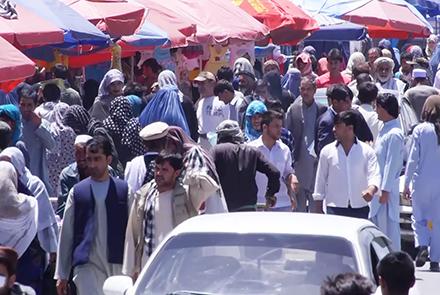Gallup's most recent survey of Afghans, conducted in July, revealed strikingly low levels of optimism and well-being across a range of indicators in the country with Afghans' ratings of their own lives as lower than any other population's worldwide.
Asked to rate their current lives on a scale where "0" represents their worst possible life and "10" their best possible life, Afghans give an average rating of 2.7 in 2018, down from 4.2 in 2016.
The current figure is in fact tied for the lowest Gallup has recorded in any country since it began tracking these measures in 2006. Asked to predict where their lives will be in five years on the same scale, Afghans' average response is 2.3 -- a new low for any country in any year.
Asked by Gallup how good they anticipate life to be in five years, approximately all of the 1,000 respondents said that they do not see a breakthrough in their economic woes at least in the short term period.
“There is chaos when you assess the situations in Afghanistan, therefore we are pessimist about our future,” said one resident in Kabul Arzo.
It is very difficult to be hopeful when you see the present situation in Afghanistan” a resident of Kabul Hajji Mohammad Taqi said.
“There are problems, but the Afghan government and the Afghan nation are united,” said Omid Maisam, deputy spokesman to CEO Abdullah Abdullah.
The unprecedented nature of the findings highlights Afghans' near-universal lack of optimism -- a finding that is all the more notable given the population's very young age structure: two-thirds of adults interviewed for the statistically representative 2018 survey are aged 35 or under.
According to the Gallup report, Afghans also give extremely negative responses using another common approach to measuring well-being which asks people about the quality of their day-to-day experiences and emotions.
This year, 36 percent of Afghans said they smiled or laughed a lot the previous day, down from 52 percent in 2016; the figure matches the lowest Gallup has recorded in any country over the past 12 years.
In addition, 52 percent of Afghans said they experienced worry for much of the previous day, up from 42 percent in 2016.
In addition, the proportion of Afghans who say they experienced enjoyment and who say they were treated with respect the previous day both fell below half (48 percent) for the first time in 2018.
Gallup stated that the current historically low well-being results reflect the suffering of a people with very little control over their own destinies.
Afghanistan's infrastructure -- including its healthcare and education systems -- is spotty and unreliable after decades of conflict, read the report adding that the country has one of the world's lowest literacy rates, at 31 percent, giving residents little opportunity to improve their economic status.
In 2018, 57 percent of Afghans say there were times in the past year when they didn't have enough money to buy food for themselves or their families, and 50 percent said there were times when they did not have enough money to pay for shelter.
Almost no Afghans see their economic situation improving anytime soon, read the report.
This year, on four percent said their standard of living was improving; this is lower than or on par with the lowest figures Gallup has recorded from any country since 2006, including the most desperately poor countries in Africa and Asia.
Seven percent of Afghans said their standard of living was staying the same, while 52 percent said it was getting worse.
Gallup's 2018 survey in Afghanistan reveals just how devastating the negative cycle of poverty and violence has been to Afghans' daily experiences, reports Gallup.
“Two of the most fundamental human requirements -- physiological needs like food and shelter, and the need for safety and security -- are consistently lacking in their lives, leading to alarmingly low levels of hope and well-being,” read the report.
Gallup also stated: “As many analysts have noted, given the country's current status, there are no good options for resolving U.S. and NATO involvement in Afghanistan. In considering any new strategy, however, policymakers should not lose sight of the truly desperate situation the Afghan people find themselves in.”


